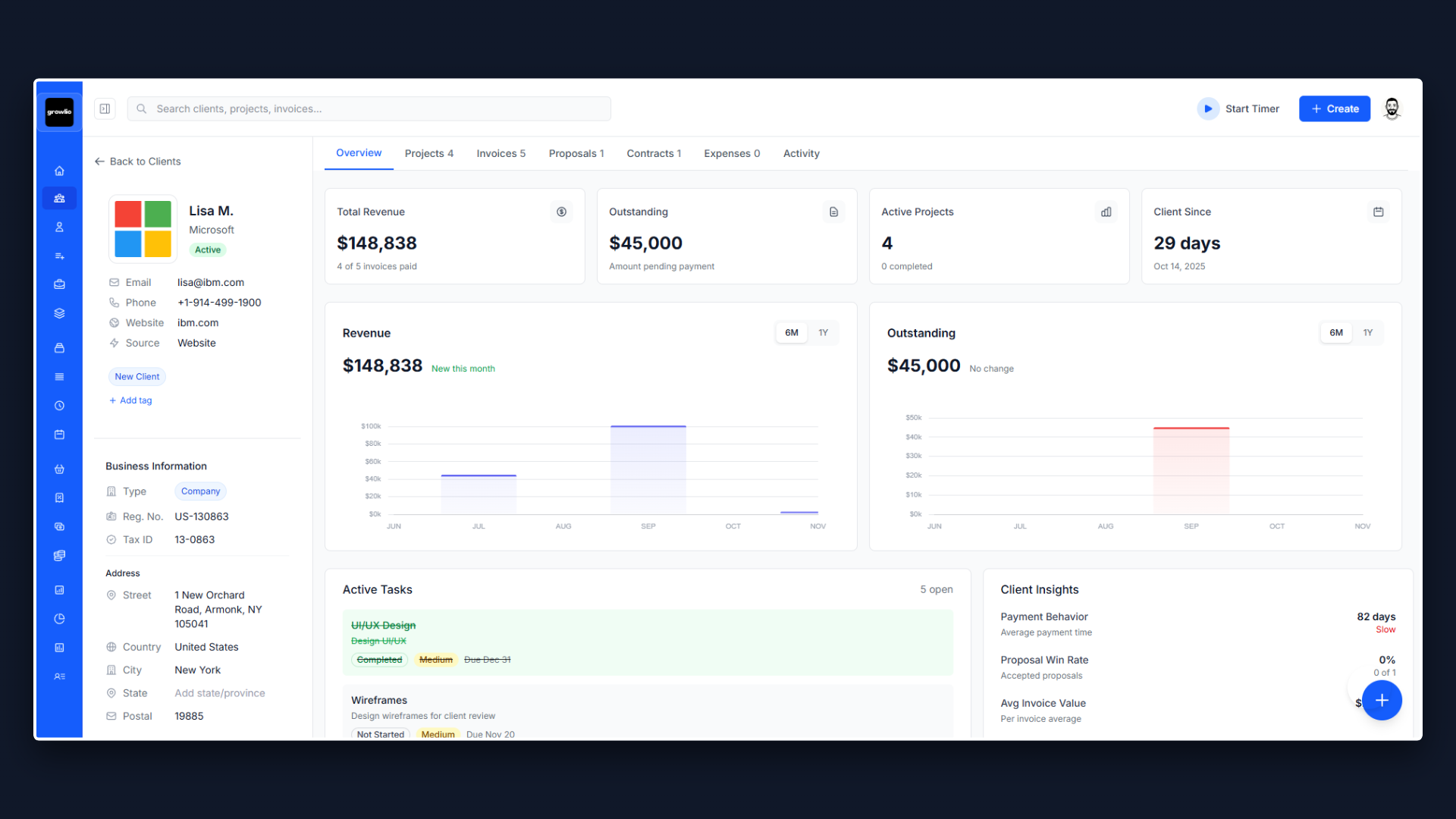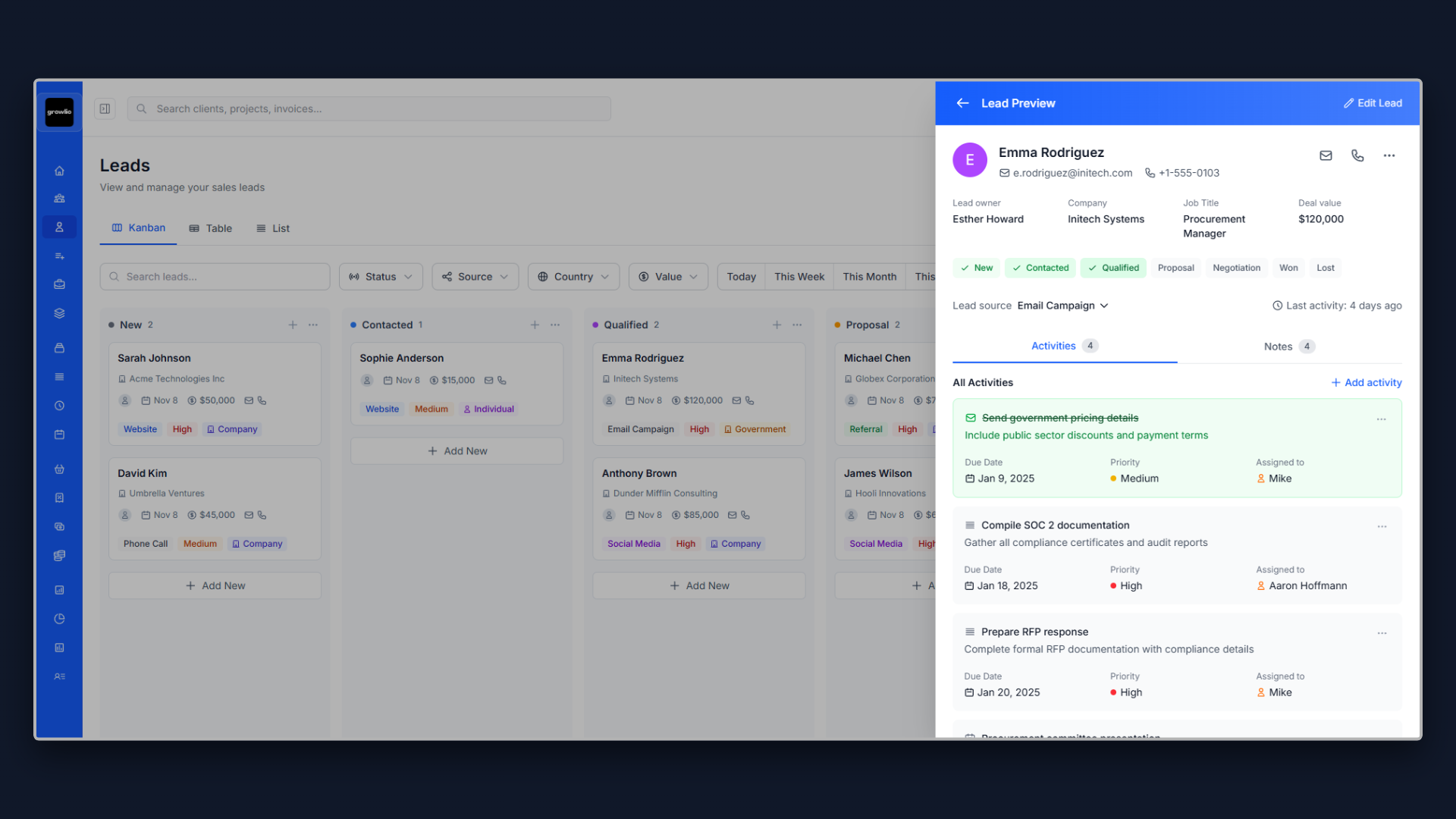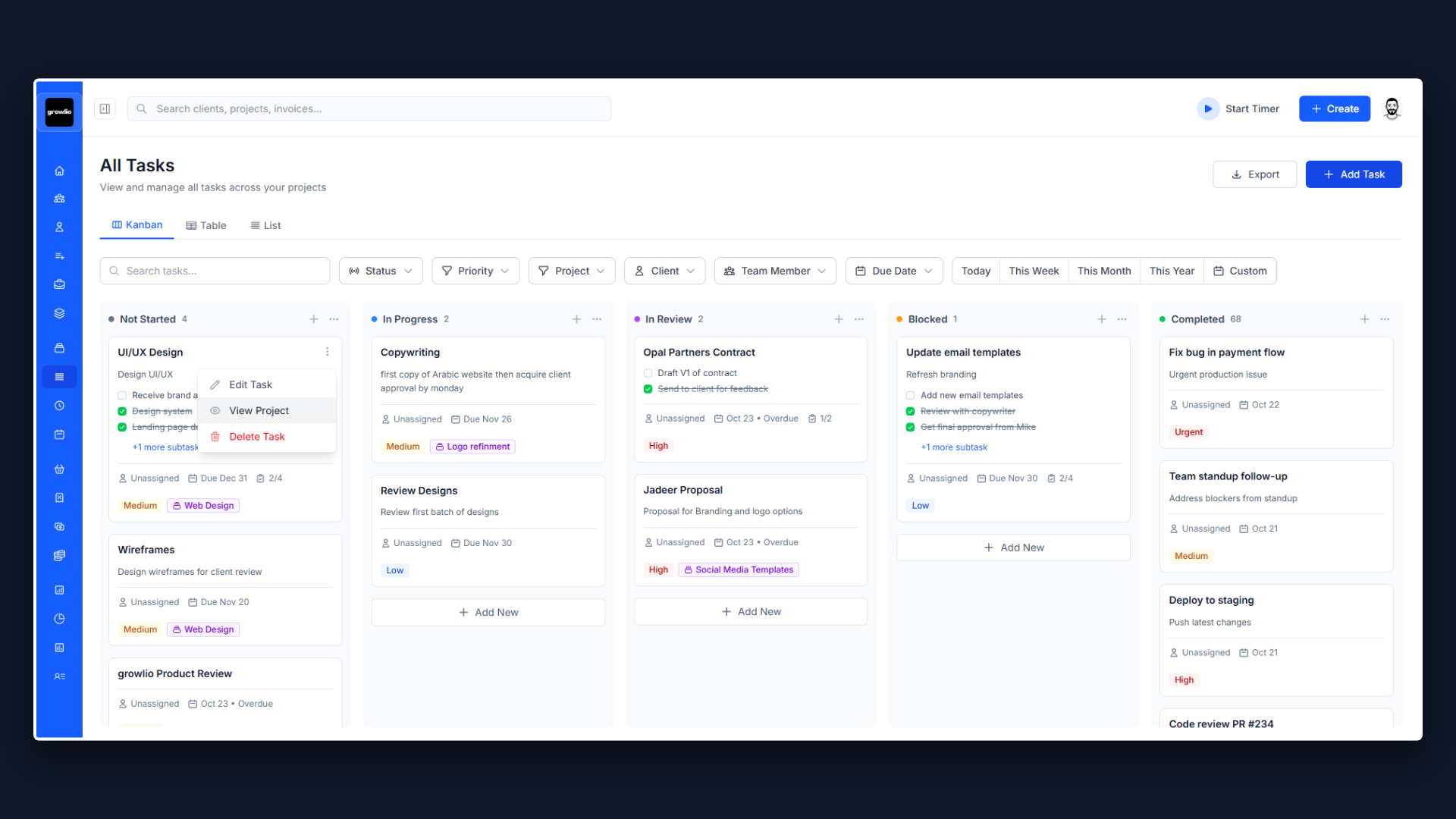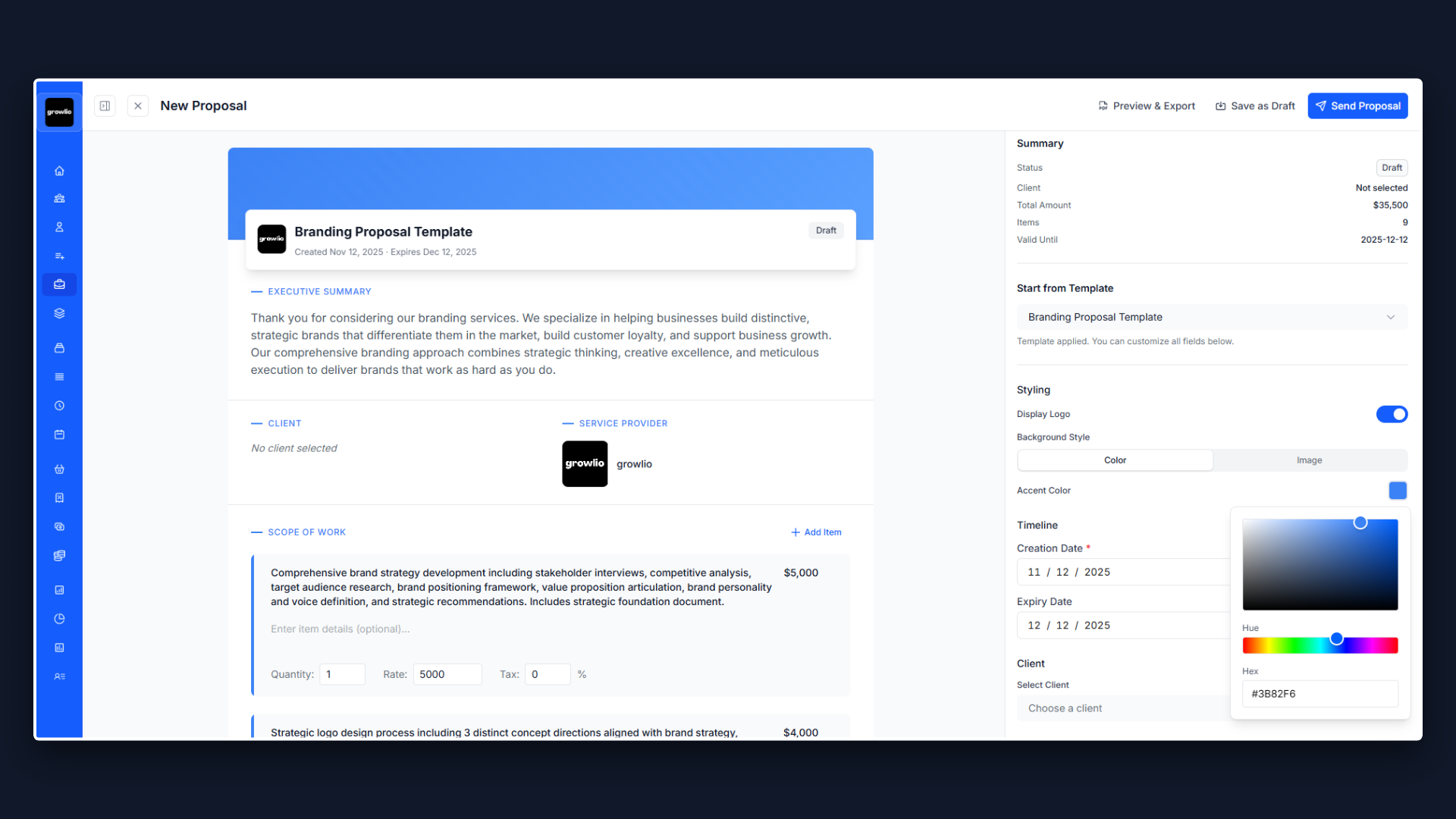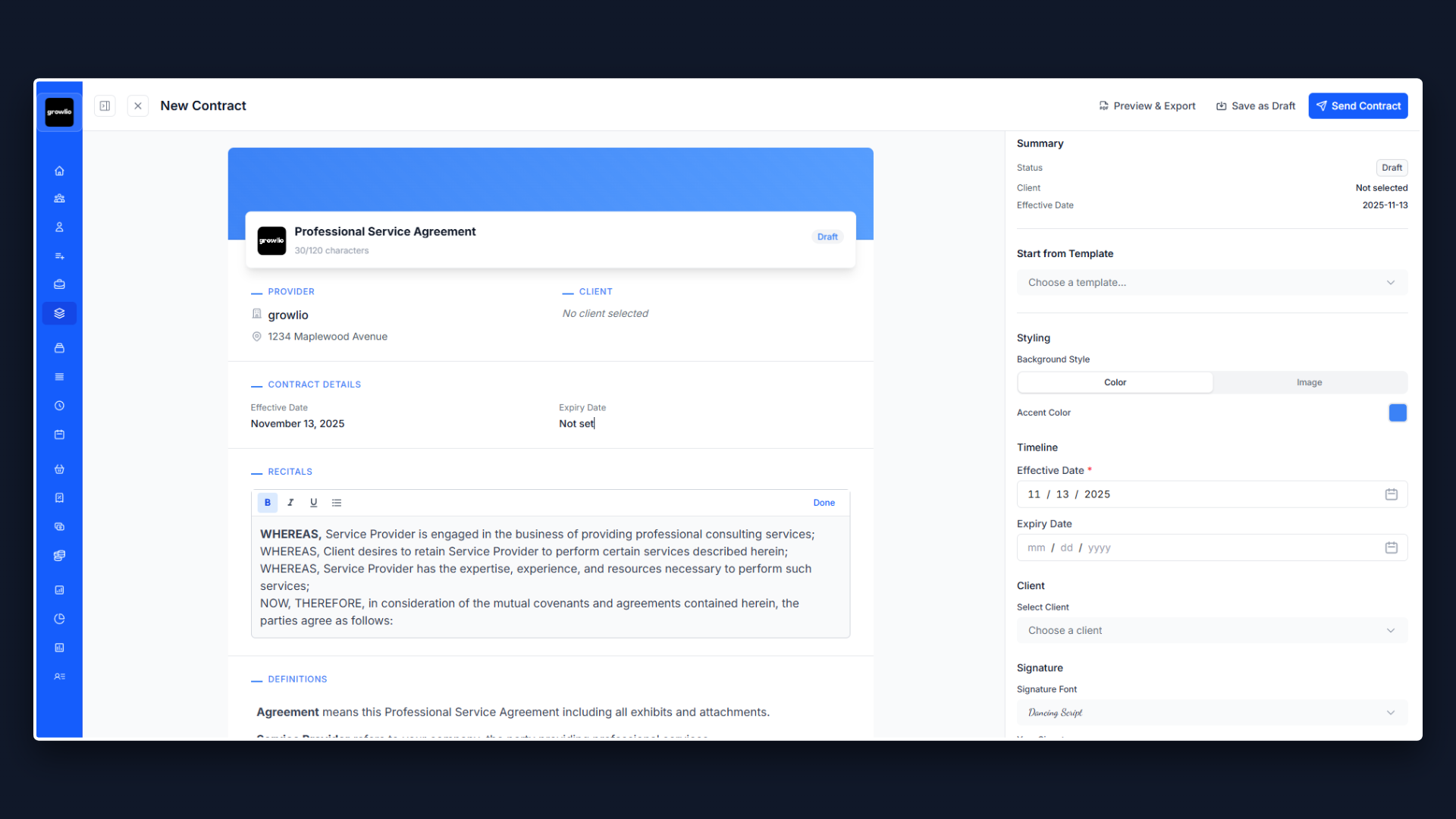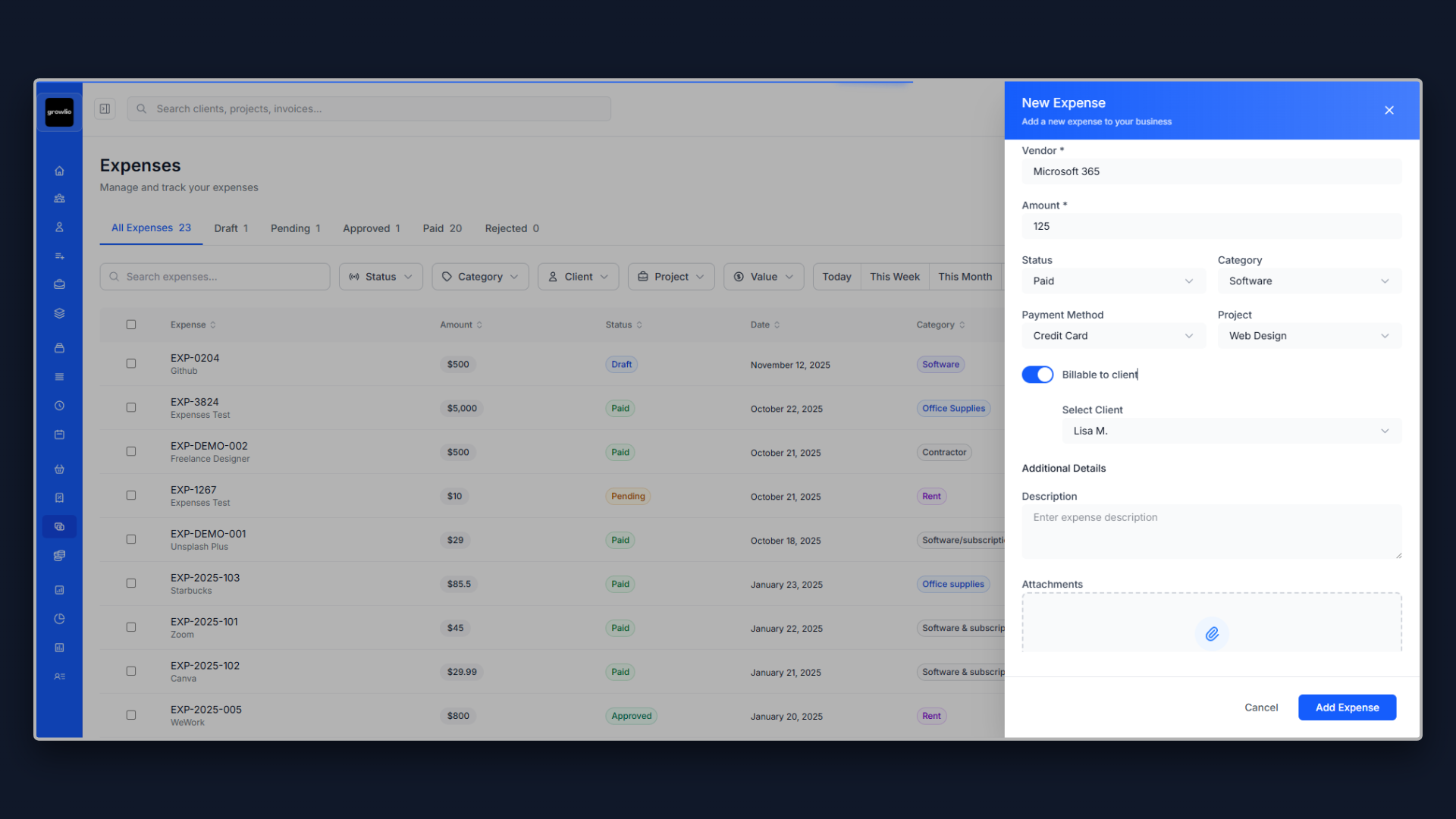Why Your Marketing Consulting Proposal Makes or Breaks Your Business
As a marketing consultant or strategy firm, you know that companies with documented marketing strategies are 313% more likely to report success and that strategic marketing consulting delivers average ROI of 5-10x. But here is the harsh reality: even if you are exceptional at developing winning marketing strategies and transforming marketing performance, you will struggle to win clients if your proposals do not demonstrate your value clearly.
The marketing consulting industry generates over $60 billion annually, with businesses increasingly recognizing that reactive, tactical marketing loses to strategic, data-driven marketing programs. Yet many talented marketing consultants lose contracts to competitors who simply write better proposals. This has nothing to do with your consulting expertise and everything to do with how you present them.
Your marketing consulting proposal is your first impression, your sales pitch, and your contract all rolled into one document. It needs to educate prospects who may see consulting as expensive overhead while simultaneously proving you are the expert they need. This is a delicate balance that many get wrong.
1. Start With the Client's Current Marketing Problems, Not Your Services
The biggest mistake marketing consultants make is leading with a list of services: "We offer marketing strategy, channel planning, campaign development..." Your prospect does not care about your services yet. They care about their problems.
Start your proposal by demonstrating you understand their specific marketing challenges and business context. Is their marketing reactive and tactical without strategic direction? Are they spending significant budget without clear ROI? Is marketing disconnected from business goals and revenue targets? Are channels operating in silos without coordination? Do they lack the expertise to execute modern marketing effectively? Address these pain points explicitly.
For example: "Our preliminary assessment shows your marketing operates reactively—responding to requests and executing tactics without strategic framework or clear priorities. You are spending approximately $500,000 annually on marketing across paid ads, content, events, and agencies, but cannot clearly attribute revenue to marketing investments. Your sales team reports marketing leads are low quality and insufficient volume. Marketing and sales operate in silos with misaligned goals. This chaotic approach wastes budget, frustrates teams, and underdelivers on growth potential. A strategic marketing consulting engagement could establish clear strategy, align teams around revenue goals, optimize budget allocation for 40-60% better ROI, and build repeatable processes that scale—potentially generating $2-4 million in additional pipeline value annually."
This approach immediately shows you have done your homework and understand what is at stake. Now they are ready to hear your solution.
2. Include a Marketing Audit Summary to Demonstrate Your Expertise
Nothing builds credibility faster than showing you have already assessed their marketing situation. Include a brief audit summary highlighting 3-5 critical issues:
Strategic Gaps: No documented marketing strategy or annual plan, marketing tactics disconnected from business objectives, unclear target audience and ideal customer profile, missing competitive positioning and differentiation, no customer journey mapping or funnel strategy, budget allocation based on history rather than strategy.
Execution and Performance Issues: Campaigns underperforming industry benchmarks (specific metrics), inconsistent brand messaging across channels, poor integration between marketing channels, slow time-to-market for campaigns and initiatives, no systematic testing and optimization process, limited use of marketing automation and technology.
Team and Resource Problems: Marketing team lacks specific expertise areas, over-reliance on expensive agencies for execution, marketing leadership stretched thin across too many priorities, no clear roles, responsibilities, and processes, team executing tactics without strategic context, burnout from constant reactive firefighting.
Measurement and Attribution Challenges: Cannot clearly connect marketing spend to revenue outcomes, using vanity metrics rather than business impact metrics, no attribution model understanding what drives conversions, making budget decisions without performance data, sales and marketing dispute over lead quality and quantity, no clear view of customer acquisition cost or lifetime value.
This mini audit serves multiple purposes: it proves you understand their situation deeply, it creates urgency by quantifying problems, and it makes your proposed consulting engagement feel essential.
3. Break Down Your Consulting Approach Into Clear Phases
Marketing consulting engagements can be complex, but your proposal should not confuse clients. Break your approach into clear, logical phases.
Phase 1: Discovery & Audit (Week 1-3)
Stakeholder interviews with leadership and team, comprehensive marketing audit across all channels, competitive analysis and market positioning assessment, customer research and journey mapping, technology and data infrastructure review, budget and resource analysis, SWOT analysis and opportunity identification, current state documentation and findings presentation.
Phase 2: Strategy Development (Week 3-6)
Business objectives and marketing goals alignment, target audience definition and persona development, competitive positioning and differentiation strategy, channel strategy and marketing mix recommendations, customer journey and funnel optimization, budget allocation and resource planning, KPI framework and measurement strategy, marketing technology stack recommendations.
Phase 3: Planning & Roadmap (Week 6-8)
Annual marketing plan development, quarterly campaign planning and themes, channel-specific tactics and execution plans, content calendar and asset requirements, marketing technology implementation roadmap, team structure and hiring recommendations, budget breakdown and investment priorities, 90-day quick wins and long-term initiatives.
Phase 4: Implementation Support (Week 8+)
Campaign launch support and oversight, agency selection and management guidance, marketing team coaching and capability building, performance monitoring and optimization, monthly strategy reviews and adjustments, ongoing advisory and troubleshooting, quarterly business reviews and planning, measurement and reporting framework setup.
This phased approach makes marketing consulting feel manageable and shows you have a systematic methodology for driving marketing transformation.
4. Set Realistic Expectations About Timeline and Outcomes
One of the fastest ways to lose trust is overpromising results. Clients appreciate honesty about consulting timelines and what outcomes are achievable.
Be explicit: "Marketing transformation takes time to assess, strategize, and implement. A typical strategic consulting engagement takes 3-6 months to complete strategy development and initial implementation, with ongoing results building over 6-12 months as new strategies take effect. Quick wins are possible in 30-60 days, but sustainable marketing transformation requires patience and commitment. We deliver strategy that works for years, not quick fixes that fade."
Provide a realistic projection: "Based on typical consulting engagements, you can expect: Month 1-2: Discovery and audit complete, clear understanding of current state and opportunities. Month 2-3: Comprehensive marketing strategy documented and presented. Month 3-4: Detailed implementation roadmap and quick wins launched. Month 4-6: Initial campaigns executing, processes improving, early results visible. Month 6-12: Full strategy impact measurable—30-50% improvement in marketing efficiency, 2-3x improvement in marketing-attributed pipeline, 40-60% better budget ROI, scalable processes and team capabilities."
Address consulting role clarity: "We are strategists and advisors, not an execution team. We develop strategy, roadmaps, and processes—your team or agencies execute with our guidance. Some consultants offer hybrid models including execution support, but our core value is strategic thinking and expertise, not becoming your marketing department. We make your team better, not dependent on us."
This honesty builds trust and sets appropriate expectations about the consultant-client relationship.
5. Explain Your Strategic Framework and Methodology
Many clients do not understand what marketing strategy actually means. Use your proposal to educate them on your strategic approach.
Explain that effective marketing strategy includes: business alignment (marketing goals directly support revenue and growth objectives), customer focus (deep understanding of target audience needs, behaviors, and journey), competitive positioning (clear differentiation and unique value proposition), channel strategy (right mix of channels for your audience and goals), resource optimization (budget allocated based on ROI potential, not habit), measurement framework (clear KPIs tracking business impact, not vanity metrics), and scalable processes (repeatable systems that work without consultant dependency).
Outline your strategic framework: "We use a proven framework for marketing strategy development: Situation Analysis (where are you now?—audit and assessment), Strategic Foundation (who are you serving and what makes you different?—ICP and positioning), Growth Strategy (how will you acquire and retain customers?—channels and tactics), Operational Excellence (how will you execute efficiently?—processes and technology), Performance Management (how will you measure and optimize?—KPIs and attribution). This framework ensures comprehensive strategy covering all critical dimensions."
Give specific examples: "Instead of generic recommendations like 'invest more in digital marketing,' we provide specific, actionable strategy: 'Shift 30% of budget ($150K annually) from low-ROI trade shows to LinkedIn advertising and account-based marketing targeting CFOs at mid-market manufacturing companies, expected to generate 200 additional qualified leads at $750 cost-per-lead vs. current $1,200, with 3x higher lead-to-opportunity conversion rate based on sales data analysis.' This level of specificity makes strategy implementable."
This demonstrates you provide real strategy with business rationale, not generic advice.
6. Address Your Marketing Audit and Assessment Process
Audits are a critical component of consulting engagements. Explain your comprehensive assessment approach.
Explain audit importance: "You cannot develop effective strategy without understanding current state. Our audit reveals what is working, what is broken, and where opportunities exist. We assess: marketing performance across all channels with benchmark comparisons, competitive positioning and market share, customer journey and funnel performance, marketing technology and data infrastructure, team capabilities and resource allocation, brand strength and messaging effectiveness, budget efficiency and ROI by channel. Audit findings inform strategic priorities and investment decisions."
Outline audit methodology: "We conduct audits through: stakeholder interviews (10-15 interviews with leadership, marketing team, sales, customers), data analysis (reviewing performance data from Google Analytics, CRM, advertising platforms, marketing automation), competitive intelligence (analyzing competitor strategies, messaging, channels, digital presence), customer research (surveys or interviews with customers and prospects understanding their journey), technology assessment (evaluating marketing tech stack, integration, utilization), process review (documenting current workflows, approval processes, campaign development). Comprehensive audit takes 2-4 weeks depending on complexity."
Address audit deliverables: "You will receive detailed audit report (40-60 pages) covering findings across all dimensions, executive summary (5-7 pages) highlighting critical issues and opportunities, visual presentation deck (30-40 slides) for stakeholder communication, prioritized recommendations (quick wins vs. strategic initiatives), competitive positioning analysis and benchmarking. Audit provides objective foundation for strategic decision-making."
7. Explain Your Go-to-Market and Channel Strategy Approach
Channel strategy is often poorly developed. Show prospects your systematic approach to channel selection and optimization.
Explain channel strategy framework: "Not all channels work for all businesses. We develop channel strategy based on: target audience behavior (where do they spend time and seek information?), funnel stage fit (which channels work for awareness vs. consideration vs. decision?), competitive dynamics (which channels are saturated vs. opportunity?), resource constraints (which channels can you execute well with available budget and team?), ROI potential (which channels deliver best return based on data and benchmarks?). We recommend specific channel mix tailored to your situation, not generic best practices."
Outline channel assessment: "We assess performance and potential across: paid channels (Google Ads, social media advertising, display, retargeting), organic channels (SEO, content marketing, social media, email), partnership channels (affiliates, referral programs, co-marketing), offline channels (events, direct mail, trade shows, PR), emerging channels (podcasts, communities, influencer partnerships). For each channel, we evaluate current performance, benchmark against industry standards, estimate improvement potential, and provide go/no-go recommendations with rationale."
Address budget allocation: "We provide data-driven budget allocation recommendations: current spend by channel with ROI analysis, recommended reallocation based on performance and opportunity, investment priorities and phasing, expected outcomes and success metrics. For example: reduce event spend from $200K to $100K (low ROI), invest $75K in content marketing (currently underfunded), allocate $25K to new podcast sponsorship test. Every recommendation backed by reasoning and expected impact."
8. Explain Your Marketing Technology and Data Strategy
Marketing technology is increasingly critical. Demonstrate your expertise in martech and data strategy.
Explain martech importance: "Modern marketing requires integrated technology stack. We assess and recommend: CRM and marketing automation (HubSpot, Salesforce, Marketo), analytics and attribution (Google Analytics, data warehouses, BI tools), content management (CMS, DAM, collaboration tools), advertising platforms (Google, Facebook, LinkedIn, programmatic), SEO and competitive intelligence tools, email and communication platforms. Right technology enables scale, personalization, and measurement. Wrong technology wastes budget and frustrates teams."
Outline technology assessment: "We evaluate your current martech stack: utilization assessment (are you using tools effectively or wasting licenses?), integration analysis (are tools connected or creating data silos?), capability gaps (what can you not do with current stack?), cost-benefit analysis (which tools deliver ROI vs. expensive shelf-ware?), vendor consolidation opportunities (can you reduce complexity?), future roadmap alignment (do current tools support where you are going?). Technology should enable strategy, not constrain it."
Address data and measurement: "Data strategy is foundational: attribution modeling (understanding what drives conversions), customer data platform (unified customer view), dashboard and reporting (accessible insights for decision-making), data governance (privacy, compliance, security), analytics capability building (team skills and processes). We help you move from gut-feel decisions to data-driven marketing optimization."
9. Explain Your Team and Capability Development Approach
Marketing team effectiveness matters as much as strategy. Address how you build internal capabilities.
Explain capability building: "We do not just deliver strategy documents—we build your team capabilities to execute and optimize: marketing team coaching and mentoring, best practice training and workshops, process documentation and playbooks, templates and frameworks for ongoing use, agency and vendor management guidance, hiring recommendations and job descriptions, organizational structure recommendations. We transfer knowledge so you can sustain results after engagement ends."
Outline team assessment: "We assess team capabilities and structure: skill gap analysis (what expertise is missing?), capacity assessment (is team underwater or right-sized?), organizational design (do you have right structure for strategy?), agency relationship evaluation (are agencies delivering value?), career development and retention (how to keep top talent?), hire, train, or outsource recommendations for capability gaps. Sometimes you need better strategy, sometimes you need better team—we diagnose honestly."
Address change management: "Marketing transformation requires change management: stakeholder alignment (getting buy-in from leadership and teams), communication planning (explaining why changes matter), training and onboarding (ensuring team can execute new approaches), process adoption (making new ways of working stick), resistance management (addressing concerns and pushback), celebrating wins (recognizing progress and results). We help you navigate organizational dynamics and politics that often derail marketing transformation."
10. Include Case Studies and Proof of Results
Nothing sells like proven results. Include 2-3 relevant consulting case studies showing strategy impact and business outcomes.
Format them simply: Client: B2B SaaS company in HR technology space with stagnant growth. Challenge: Marketing spending $600K annually with unclear ROI, sales complaining about lead quality, no clear strategy or positioning, reactive tactical execution. Consulting Engagement: Conducted comprehensive audit, developed differentiated positioning, rebuilt marketing strategy with account-based marketing focus, reallocated budget toward high-ROI channels, implemented marketing automation and lead scoring. Results: 140% increase in marketing-qualified leads, 68% improvement in lead-to-opportunity conversion (sales stopped complaining), $1.2M increase in marketing-attributed pipeline, 55% reduction in cost-per-lead, marketing team confidence and capability dramatically improved, strategy delivered 8.5x ROI in first year.
Show specific impact areas: "Our consulting delivers measurable business impact: strategy and positioning (clear differentiation leading to 30-50% higher win rates), budget optimization (reallocating spend for 40-60% better ROI), funnel improvement (optimizing conversion at each stage for 2-3x more pipeline), team effectiveness (building capabilities reducing agency dependency 40-50%), measurement and attribution (clear ROI visibility enabling better decisions), scalable growth (processes and systems supporting predictable growth)."
Address consultant credibility: "Our consultants bring deep expertise: 10-15 years marketing leadership experience at high-growth companies, proven track record of marketing transformation across industries, strategic frameworks and methodologies refined over 50+ engagements, ability to operate at executive level and in tactical details, balanced perspective of what is theoretically right and practically achievable. You are not hiring junior consultants learning on your dime—you are accessing senior strategic expertise."
If you are newer to consulting, reference: marketing leadership experience from corporate roles, specific transformations you led as an employee, methodologies and frameworks you have developed, client testimonials even if engagement was smaller, or focus on specialized expertise (B2B SaaS marketing, demand generation, etc.) demonstrating depth.
11. Transparent Pricing That Reflects Value
Marketing consulting pricing varies by scope and engagement model. However, vague pricing makes clients nervous.
Provide clear pricing options: Marketing Strategy Sprint - $15,000: 4-week intensive engagement, focused marketing audit and assessment, strategic framework and positioning, channel strategy recommendations, 90-day implementation roadmap, 2-3 stakeholder workshops, deliverables documentation. Comprehensive Marketing Consulting - $35,000: 8-12 week engagement, deep marketing audit across all dimensions, comprehensive marketing strategy development, detailed implementation roadmap and tactics, team and organizational recommendations, 4-6 stakeholder workshops, ongoing email and call support. Fractional CMO / Strategic Advisor - $8,000/month: Ongoing monthly retainer (6-12 month commitment), strategic leadership and decision-making support, monthly strategy sessions and planning, campaign review and optimization guidance, team coaching and capability building, vendor and agency management, 10-15 hours monthly availability. Marketing Transformation Program - $60,000: 6-month comprehensive engagement, full discovery and audit, complete strategy and planning, implementation support and campaign oversight, team training and capability building, technology and process implementation, monthly business reviews, deliverables plus hands-on guidance.
Explain pricing rationale: "Consulting pricing reflects expertise value, not hourly rates. Our engagements deliver: senior consultant with 10-15 years experience (not junior team), proven methodologies and frameworks, strategy that drives measurable business results, knowledge transfer building internal capabilities, deliverables you can use for years. Typical ROI is 5-10x in first year through better budget allocation, improved conversion rates, and team effectiveness."
Address investment perspective: "Marketing consulting is investment, not expense. If our strategy increases your marketing ROI by 50% on a $500K annual budget, that is $250K additional value annually—paying for the engagement 7x over. If we help you avoid $200K failed campaign through better strategy, the engagement pays for itself. Smart companies see consulting as competitive advantage and risk mitigation."
12. Make Next Steps Crystal Clear
Do not leave your prospect wondering what happens next. End your proposal with a clear call to action and process.
"Ready to transform your marketing from chaotic and reactive to strategic and results-driven? Here is how we get started: Step 1: Sign the proposal and return it by [date] to reserve engagement start date. Step 2: We will schedule a kickoff meeting within 48 hours to align on objectives and logistics. Step 3: Discovery and audit begins immediately with stakeholder interviews scheduled. Step 4: Strategic recommendations delivered within agreed timeline, with implementation support ongoing. Questions? Schedule a call with me at [calendar link] or reply to this email."
This removes friction and makes it easy for prospects to say yes. The clearer you make the path forward, the more likely they are to take it.
Final Thoughts on Marketing Consulting Proposals
Your marketing consulting proposal is not just a formality—it is a sales tool, an educational resource, and a trust-building document. The marketing consultants who win the most clients are not always the ones with the biggest firms; they are the ones who best explain consulting value and approach in a way that resonates with business leaders.
Take the time to customize each proposal for your prospect. Reference their specific marketing challenges, business context, and strategic opportunities. Show that you understand their industry and competitive landscape. Demonstrate your expertise through an audit summary and strong case studies showing business impact. Set realistic expectations about timeline and what consulting delivers. And make it easy to say yes.
Remember: a great marketing consulting proposal proves you understand their business and marketing challenges, demonstrates you have proven methodology and strategic frameworks, shows evidence you can deliver measurable business results and ROI, and makes the investment feel worthwhile given potential impact. Get these elements right, and you will win more engagements—even if your competitors have bigger names or lower fees.
